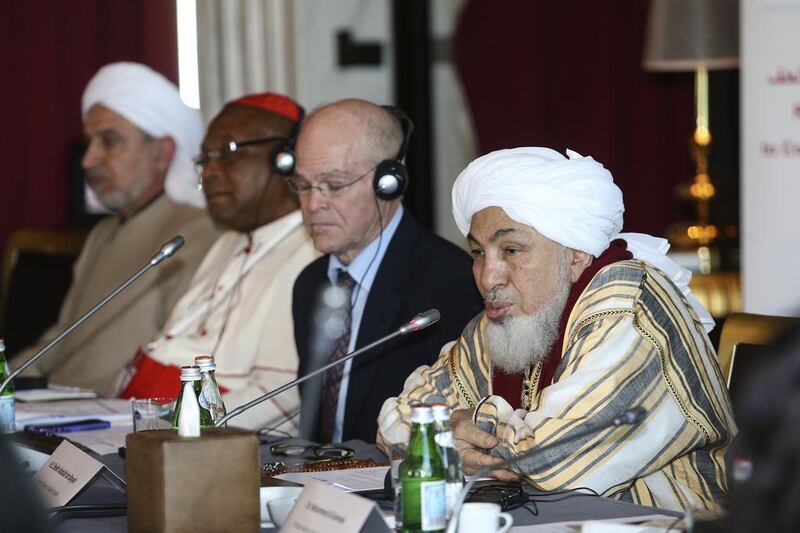ABU DHABI // Spiritual leaders and scholars representing the world’s major religions gathered in the capital for a two-day conference to unite against violent religious extremism and work together to combat it.
The leaders on Saturday announced a 10-point action plan that they will initiate over the next three years aimed at combating religious extremists who misinterpret religious text to advance their own agenda.
“This plan is not impossible to implement,” said Sheikh Abdullah bin Bayyah, president of the Forum for Peace in Muslim Societies and co-moderator of the forum.
“Within these two days, we talked about one of the most important subjects that preoccupies us, that is peace and security in the world.
“I think that we may not disagree on the significance of this subject, of the necessity to establish peace and security across the world, specifically in this area, in the Middle East, which unfortunately has been blighted by the consequences of its own wars.”
The meeting was jointly hosted by the UAE-based Forum for Promoting Peace in Muslim Societies and Religions for Peace, a multifaith coalition based in New York. Funding for the two groups comes from governments, individuals, foundations and the United Nations.
“It’s a battle for the hearts and minds of people in many parts of the world,” said Dr William Vendley, secretary general of Religions for Peace.
“And if they don’t hear from their own religious leaders about what their own tradition is talking about, then otherwise very wonderful young people, often in very complicated and distressed situations, will be given very brutally false interpretations of their faith.”
Dr Vendley called upon the religious communities to put forth the true teachings of their religions.
“This is the duty anyway, even if we didn’t have violent religious extremism, for the religious communities to communicate their own truest meanings,” he said.
“It’s a competitive space now: there are brutal contenders for what it means to be a Christian, for what it means to be a Jew or a Muslim or any other faith.”
As part of the action plan, the leaders will develop counter-violent-extremism tool kits, equip a global response team, train local and national leaders in countering religious extremists, launch a large-scale social-media campaign, provide humanitarian assistance to populations at risk of adopting violent extremist philosophies, and initiate several programmes, at grassroots and mainstream media levels, to build understanding, promote tolerance and rehabilitate and de-radicalise worshippers.
The leaders also unanimously adopted a multifaith statement that expressed their concern and rejection of violent religious extremism and called on governments, the United Nations and religious communities to work together in promoting human dignity and combating extremist narratives.
“Violent religious extremism is not in anybody’s interest and it cannot promote any genuine religion, on that we all agree,” said Cardinal John Onaiyekan, archbishop of Abuja, Nigeria.
“We are aware that those terrorists don’t really listen to their spiritual leaders, but we cannot sit quiet simply because they will not listen to us.
“We should keep talking because even when they don’t listen, other people are hearing that we are condemning them.
“And if you’re talking in the context of Christians and Muslims, we Christians want to hear Muslim leaders clearly and frequently distance themselves from what these people are doing because that will help us to talk to our own constituency.”
rpennington@thenational.ae






